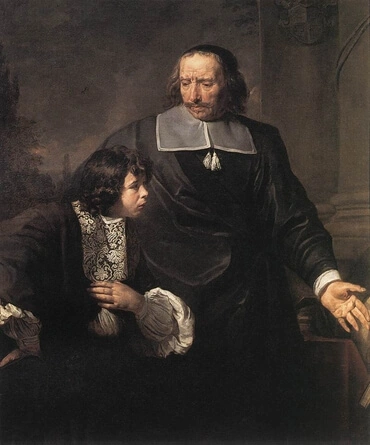1
And Jehovah said to▵ Moses, Say to▵ the priests, the sons of Aaron, and Say to▵ them, He shall not defile himself as··to the soul* among◦ his people;
2
but◦ for his kin, that is near to▵ him, for his mother, and for his father, and for his son, and for his daughter, and for his brother,
3
and for his sister, a virgin, that is near to▵ him, who has not had◦ a husband◦; for her he may defile himself.
4
But he shall not defile himself, being a master* among his people, to profane himself.
5
They shall not make··bald a baldness on◦ their head, neither shall they shave··off the corner▵ of their beard, nor on◦ their flesh lacerate with a laceration.
6
They shall be holy to their God, and not profane the name of their God; for the fire··offerings of Jehovah, and the bread of their God, they◦ do offer: and they shall be holy.
7
They shall not take a woman that is a harlot, and they shall not take a profane woman driven··out from her husband◦; for he◦ is holy to his God.
8
And thou shalt sanctify him; for he◦ offers the bread of thy God; he◦ shall be holy to thee: for I◦ Jehovah, who sanctifies you, am holy.
9
And the daughter of a man◦ a priest, if▫ she profanes herself by committing··harlotry, she◦ is profaning her father, she shall be burnt··up with fire.
10
And the great priest of his brothers, on whose head the anointing oil was poured, and whose hand is filled to clothe with the garments, his head he shall not expose, and his garments he shall not unstitch;
11
neither shall he go··in to any dead soul, nor defile himself for his father, or◦ for his mother;
12
neither shall he go··out of the sanctuary, nor profane the sanctuary of his God; for the crown◦ of the anointing oil of his God is upon him; I◦ am Jehovah.
13
And he◦ shall take a wife in her virginity;
14
a widow, and her that is driven··out, and a profane harlot, these he shall not take; but◦ he shall take a virgin from his own people for a wife.
15
Neither shall he profane his seed among◦ his people; for I◦, Jehovah, do sanctify him.
16
And Jehovah spoke to▵ Moses, saying,
17
Speak to▵ Aaron, saying, A man◦ of thy seed for their generations who hath in him a blemish, he shall not come··near to offer the bread of his God.
18
For whatever man◦ he be who has a blemish, he shall not come··near; a blind man◦, or a lame, or he that is··shortened, or too··long◦,
19
or a man◦ that has a broken foot or broken hand,
20
or hunchbacked, or crushed, or confused in his eye, or that has scabies, or warts, or a crumpled testis;
21
Any man◦, of the seed of Aaron the priest, who has a blemish, shall not approach to offer the fire··offerings of Jehovah; he has a blemish; he shall not approach to offer the bread of his God.
22
He shall eat the bread of his God, from the holies of the holies, and from the holies*.
23
Surely he shall not go··in to▵ the veil, nor shall he approach the altar, for he has a blemish; that he profane not My sanctuaries; for I◦, Jehovah, do sanctify them.
24
And Moses spoke it to▵ Aaron, and to▵ his sons, and to▵ all the sons of Israel.







